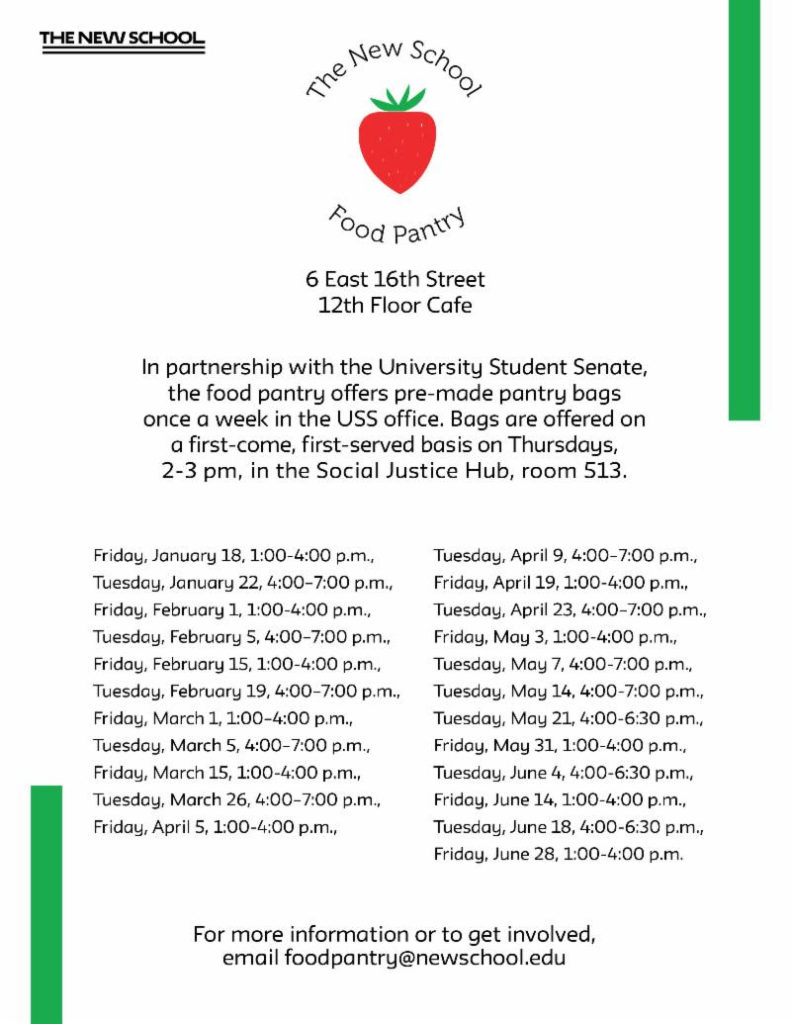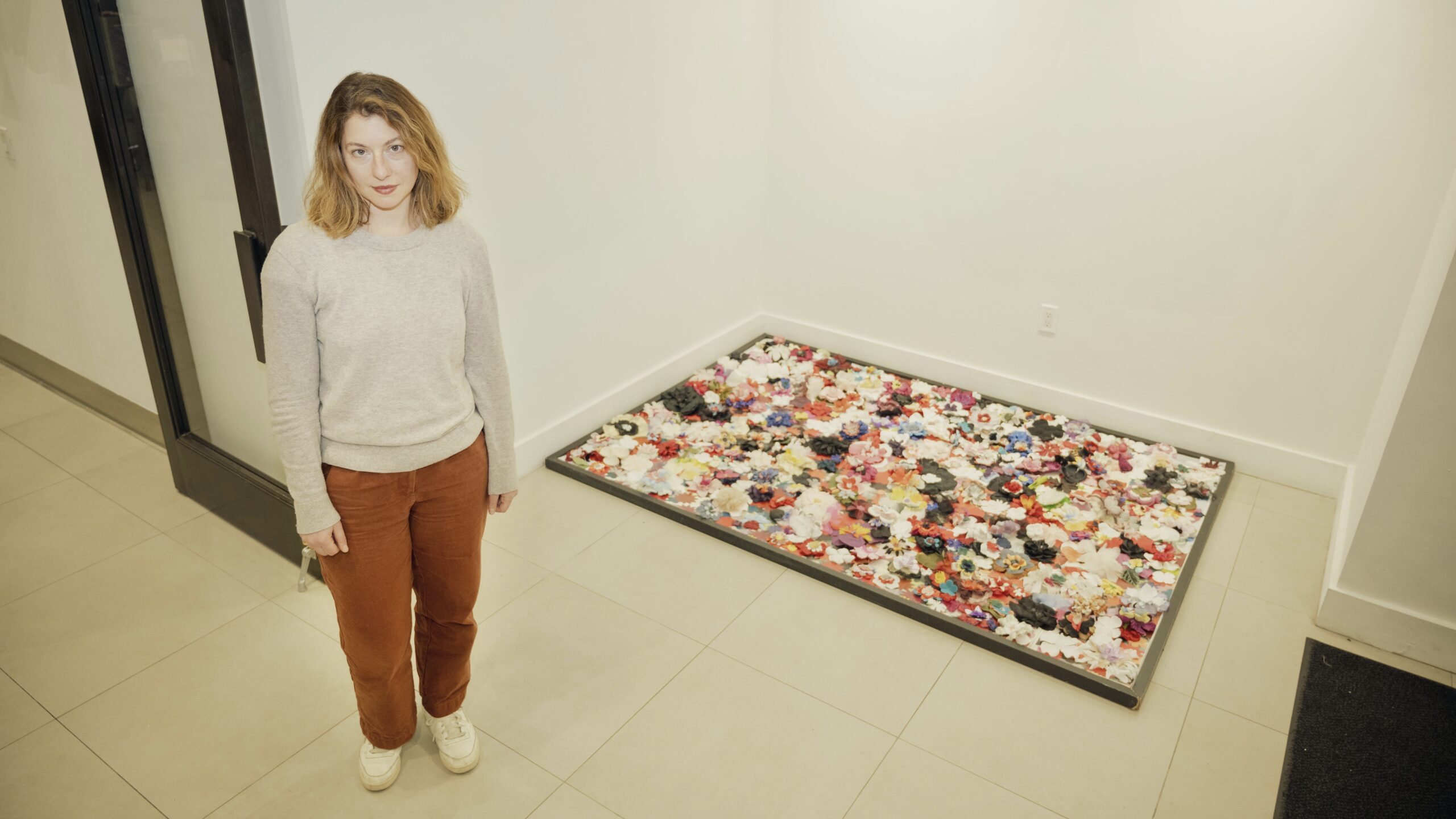The last thing any college student should be worrying about is where their next meal is coming from, but the reality is not every New School student is food secure.
At the end of the fall semester, a new app became available on campus, called Share Meals. It aims to alleviate food insecurity by sharing financial resources as well as information about where free food is available on campus.
Katie Tzivanis, a 20-year-old second-year politics and urban studies student, and co-chair of the University Student Senate, discovered the app being used at NYU and brought it to the New School.
Tzivanis met with the creator of the app, Jon Chin, an NYU graduate student, to discuss bringing Share Meals to the New School.
Share Meals has been available at NYU for nearly six years and currently has more than 2,000 students signed up, according to Chin. Students have even created a club called Share Meals at NYU that, according to their mission statement posted online, is “dedicated to eliminating food insecurity and social isolation at NYU by empowering students to share food and conversation.”
Chin explained that in order for the app to work there has to be community support, especially from the administration.
“The administration at NYU is using Share Meals as a major tool to address food insecurity on campus,” said Chin. “So we’ve got full support from them, full support from our student government, and full support from our student body.”
After meeting with Chin and seeing how successful the app is at NYU, Tzivanis went to the New School’s the Office of Support and Crisis Management to propose creating a partnership between the school and the app.
“We’re hoping as more people learn about it, that we’ll be able to get more students access to food, but also that it will help to reduce waste on campus,” said assistant director of Student Support and Crisis Management, Andrea MacFarlane.
Share Meals is currently available on both the Apple App Store and Google Play, but the University Student Senate plans to promote it more within the next couple months.
On the app, students can find school-specific events that have free food as well as meal swipes (the New School’s Dining Dollars) being offered by fellow students.
“There’s a messaging aspect to the app, so you guys can coordinate where to meet,” said Tzivanis. “They’ll have to come with you to the cafeteria and pay for you.”
“We wanted to teach staff and faculty how to use it before we launched it to the students, because if we launched it without there being any food options, there’d be a lot of demand and no providing,” said Tzivanis. “But if people don’t know about it, it doesn’t have a purpose.”
Another important resource for struggling students is the food pantry, but Tzivanis pointed out that it doesn’t work for everyone.
“The majority of the food in the food pantry requires the individual to have access to a kitchen, she said. “And a lot of the people that I know who are food insecure are also homeless or housing insecure, and so they couldn’t cook the food unless they had access to a kitchen.”
A student worker, who asked to remain anonymous for the sake of job security, and has worked at the Food Pantry for three years, explained that the Food Pantry was not intended to be a main food source for struggling students, but instead a supplemental resource.
“It’s not open everyday, and especially when it was just the non-perishable items, there were definitely some students who were very frustrated,” the worker said.
213 students visited the pantry between July 1, 2017 to June 30, 2018, according to the Food Pantry Summary provided by MacFarlane. The majority (51.9 percent) of students who used the pantry were Parsons students, followed by Lang students (20.2 percent). Of those students, 36 percent had been homeless or housing insecure within the past year.

Students who want to use the Share Meals app need to create an account with their MyNewSchool email address in order to see specific New School offerings. A tab labeled “Find Free Food,” then shows a map with dropped pins. When a user clicks on the pin, a description of the event or location appears. Events also specify if they are serving kosher, vegetarian, or dairy foods.
MacFarlane hopes students will use Share Meals as a way to share their meal swipes with low-income students rather than letting extra swipes expire.
“We know that students often have left-over money in their Dining Dollars at the end of the semester, so when we’re working with the Student Senate to try to advertise to students, I think just bringing that to students’ attention and seeing that it’s sharing resources, not necessarily taking away resources from other students,” said MacFarlane.
According to Tzivanis, the Student Senate intends to require that any student event funded by them must post to Share Meals if there is free food.
Aside from the tangible benefit of providing food to those in need, the app may serve an additional purpose of connecting students.
“It’s a phenomenal way for students to interact with each other, build community, and just show how one act of kindness can really change someone’s day,” said Tzivanis.
Though the Senate is continuing to work on creating resources for food insecure students, the worker at the pantry is disappointed by the lack of effort from the administration, noting one suggestion the university appears to have ignored.
“I know there have been multiple student organizations and also staff groups who have been trying to get it so they could discount food [in the cafeteria] near the end of the day, but the university is very no-go about that,” said the pantry worker. “The cafeteria is expensive.”

In response, university spokesperson Merrie Snead wrote in an email, “While the university operates its dining services operations to break even, meaning that overall sales will cover all costs, we know that expenses can mount for students, leaving limited available funds to purchase nutritious meals and groceries. In addition to helping our students and their families through financial aid, there are a number of New School resources available.”
Besides the Food Pantry and Share Meals app, Snead added that “last fall, the university established the Food Issues Advisory Committee, comprised of faculty, students, and staff, that is focused on issues of food security, access, and sustainability on our campus.”
The worker also expressed frustration at the school not purchasing a larger fridge/freezer for the Food Pantry, which would allow them to provide frozen fruits and vegetables. However, now that the Food Pantry offers fresh produce, through Corbin Hill Farm Share, it is less of a concern.
Providing reliable sources of food will ease one burden students face and allow them to focus on other things, such as their schoolwork.
“If a student doesn’t have access to basic resources that they need, they’re not usually feeling their best, and that of course impacts their academics and many areas of their life,” said MacFarlane.
Students can easily download Share Meals, or visit the Food Pantry on the 12th floor of 6 E. 16th Street. Their hours are available online. Students worried about food or housing security should reach out to Student Support and Crisis Management.







